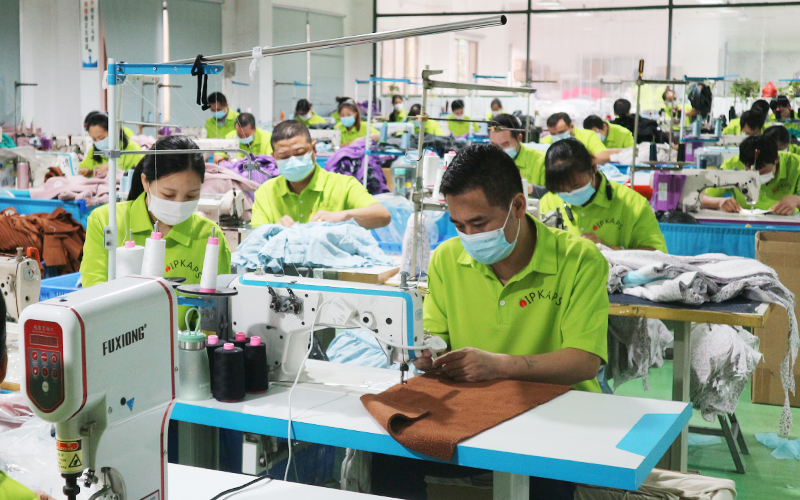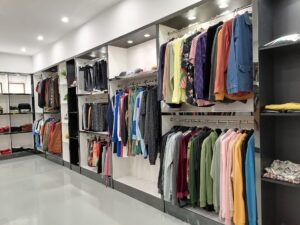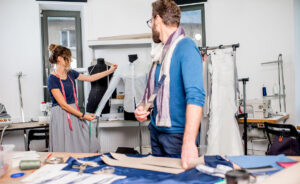In the ever-evolving fashion industry, businesses face a significant choice: work with a standard clothing manufacturer or partner with a custom clothing manufacturer. The decision depends on several factors, including product uniqueness, brand identity, and business goals. Let’s explore why choosing a custom clothing manufacturer is a smart move for companies looking to grow and succeed in today’s competitive market.

Difference Between Standard and Custom Clothing Manufacturers
A standard clothing manufacturer typically follows mass production practices. Their designs and products are often pre-set, offering limited customization. These manufacturers focus on producing large quantities of generic garments that suit a broad audience.
In contrast, custom clothing manufacturers are all about tailoring their products to specific customer needs. These manufacturers allow clients to be involved in the design process, from selecting fabrics to creating unique styles. This personalized approach results in exclusive, high-quality garments that align with the client’s vision, making custom manufacturers ideal for businesses that want to stand out in the marketplace.
The Advantages of Working with Custom Clothing Manufacturers
Choosing a custom clothing manufacturer offers numerous benefits, especially for businesses focused on quality, uniqueness, and branding. Here are some key advantages:
1. Superior Quality and Uniqueness
Custom manufacturers prioritize the quality of materials and craftsmanship. Unlike standard manufacturers who often prioritize quantity over quality, custom manufacturers take extra care in producing garments that meet high standards. The use of premium fabrics and advanced production techniques ensures that the final product not only looks good but also lasts longer.
Custom clothing is also unique. Businesses can request personalized designs that reflect their brand’s identity. This uniqueness allows companies to differentiate themselves from competitors and appeal to niche markets. For fashion brands, this can be a critical factor in gaining customer loyalty.
2. Tailored to Specific Client Needs
One of the main advantages of working with custom manufacturers is their ability to create products based on the client’s specific requirements. Whether it’s a particular fabric, color, or style, these manufacturers provide the flexibility to adapt to the needs of the business. This is particularly important for companies that want to offer personalized products to their customers, such as custom logos, embroidery, or specific sizing.
Custom manufacturers also accommodate small-batch orders, making them ideal for start-ups or smaller brands that don’t need large quantities of clothing. This flexibility can significantly reduce inventory costs and allow businesses to manage their stock more efficiently.
3. Opportunity for Emerging Fashion Brands
Custom clothing manufacturers offer a great opportunity for new fashion brands to create unique, trend-setting products without having to meet the large minimum order quantities that standard manufacturers often require. This helps smaller brands enter the market with lower upfront costs, while still delivering high-quality, unique garments.
Additionally, new brands can experiment with different designs and fabrics, allowing them to quickly adjust to market trends and consumer preferences. Custom manufacturers are usually more agile, helping emerging brands stay ahead in a fast-paced fashion environment.

How to Find the Right Custom Manufacturer
Finding the right custom clothing manufacturer is critical to your business’s success. Here are some strategies to help you in your search:
1. Online Platforms
Today, there are various online platforms where businesses can find custom clothing manufacturers. Websites such as Alibaba, Maker’s Row, and independent B2B platforms allow companies to browse through manufacturers’ portfolios, request quotes, and read customer reviews. These platforms also provide transparency, helping businesses identify manufacturers that align with their goals.
2. Offline Sources
Attending trade shows and exhibitions is another excellent way to find reliable custom clothing manufacturers. These events provide an opportunity to meet manufacturers face-to-face, evaluate the quality of their products, and discuss potential partnerships. Fashion and textile expos often attract a range of manufacturers, giving businesses the chance to compare options and make informed decisions.
Key Factors to Consider When Choosing a Manufacturer
Selecting the right custom clothing manufacturer requires careful evaluation. Here are the key factors you should consider:
1. Material and Fabric Quality
The quality of materials directly impacts the quality of your final product. When choosing a manufacturer, ensure they offer a wide range of fabric options and are experienced in working with high-quality materials. A good manufacturer should also have the ability to source specialty fabrics if needed.
2. Cost and Budget
While custom manufacturing may come with a higher price tag than standard mass production, it’s crucial to weigh the cost against the benefits, such as superior quality and product uniqueness. Ensure that the manufacturer provides transparent pricing and is willing to work within your budget, especially if you’re a new or small brand.
3. Customer Service and Communication
Effective communication is essential when working with a custom manufacturer. Delays in communication can lead to misunderstandings, production errors, and missed deadlines. Choose a manufacturer that offers strong customer service and is responsive to your needs. It’s also important to ensure they provide regular updates on the production process, from design approval to final delivery.
4. Logistics and Shipping
Reliable logistics and shipping are vital, especially for international businesses. Check the manufacturer’s track record for delivering orders on time and handling shipping processes efficiently. Some manufacturers offer logistics support, which can be beneficial if you’re shipping to multiple regions.
5. Experience and Reputation
Lastly, choose a manufacturer with a solid reputation and years of experience in the industry. Experienced manufacturers have established relationships with suppliers and are better equipped to handle complex orders. Research customer reviews, testimonials, and case studies to gauge the manufacturer’s reliability and overall performance.
Conclusion
In conclusion, partnering with a custom clothing manufacturer offers significant advantages, including product quality, uniqueness, and the ability to meet specific customer needs. For businesses, especially those in the fashion industry, working with a custom manufacturer provides the flexibility and creative control needed to succeed in a competitive market. By carefully considering factors like fabric quality, cost, communication, logistics, and reputation, companies can find the right manufacturer that aligns with their goals and helps bring their brand’s vision to life.







